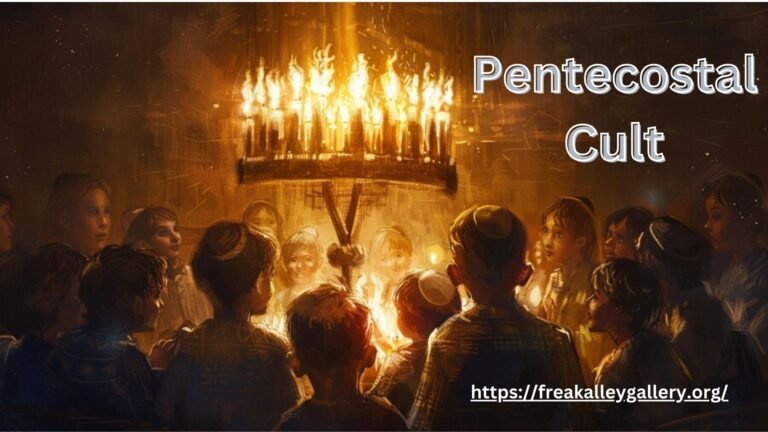The term “Pentecostal cult” is often used to describe certain groups within the broader Pentecostal movement that exhibit controversial or extreme practices. Understanding the Pentecostal movement and the context in which some of its sects have been labeled as cults can provide clarity on this complex subject. This article delves into the origins, characteristics, controversies, and perceptions of Pentecostal cults, offering a thorough examination for those seeking to understand this topic better.
What is Pentecostalism?
Origins and Development
Pentecostalism is a Christian movement that emphasizes the direct experience of the Holy Spirit. It emerged in the early 20th century, with roots in the Holiness movement of the 19th century. The movement is characterized by its focus on spiritual gifts, such as speaking in tongues, healing, and prophecy.
Core Beliefs
Pentecostals believe in the continuation of spiritual gifts and the active presence of the Holy Spirit in the lives of believers. They often practice lively worship services and emphasize personal experiences with God.
Understanding the Term “Cult”
Definition of a Cult
The term “cult” generally refers to a group with beliefs or practices that deviate significantly from mainstream religious or societal norms. Cults are often characterized by their charismatic leaders, exclusive teachings, and intense devotion from their followers.
Cult Characteristics
Authoritarian Leadership: Cults often have a central figure who exerts substantial control over members.
Exclusive Beliefs: They may hold unique doctrines that set them apart from mainstream religions.
Manipulative Practices: Cults might employ psychological manipulation to maintain control over their members.
Pentecostalism vs. Pentecostal Cults
Distinguishing Characteristics
While Pentecostalism as a whole is a legitimate and diverse Christian movement, some groups within it have been labeled as cults. These groups often exhibit extreme practices or beliefs that diverge from mainstream Pentecostalism.
Case Studies of Controversial Groups
The Branch Davidians: This group, led by David Koresh, was involved in a tragic standoff with federal authorities in 1993. Their apocalyptic beliefs and isolationist practices led to their characterization as a cult.
The Holy Ghost Church of God: Known for its intense and sometimes radical interpretations of Pentecostal teachings, this church has been criticized for its authoritarian practices and alleged manipulation of followers.
ALSO READ:Understanding the 955 Angel Number: Meaning, Symbolism, and Impact
Controversies Surrounding Pentecostal Cults
Practices and Beliefs
Pentecostal cults often engage in practices that are considered extreme by mainstream Pentecostal standards. These may include:
Excessive Emotionalism: Some groups may encourage heightened emotional experiences that can lead to manipulation.
Exclusive Salvation Claims: They might assert that only their group possesses the true path to salvation.
Authoritarian Leadership: Charismatic leaders often wield significant power and control over followers.
Social and Psychological Impacts
Members of Pentecostal cults may experience significant social and psychological impacts, including:
Isolation from Family and Friends: Cults often discourage or sever ties with outsiders.
Psychological Manipulation: Members might undergo intense pressure to conform and abandon their previous beliefs or lifestyles.
Financial Exploitation: Some cults require significant financial contributions from their members.
Addressing Misconceptions
Pentecostalism as a Whole
It’s important to distinguish between the broader Pentecostal movement and specific groups labeled as cults. Mainstream Pentecostalism is a diverse and established branch of Christianity with millions of adherents worldwide.
Negative Stereotypes
Pentecostal cults are often portrayed negatively in media and popular discourse. However, it’s crucial to approach each group with an understanding of their specific beliefs and practices, rather than applying broad stereotypes.
Conclusion
The term “Pentecostal cult” encompasses a range of groups with varying practices and beliefs. While some Pentecostal sects may be characterized as cults due to their extreme practices or authoritarian leadership, it is essential to differentiate between these groups and mainstream Pentecostalism. Understanding the nuances of Pentecostalism and the controversies surrounding certain sects can provide a clearer perspective on this complex and often misunderstood subject.
FAQs
What makes a group a Pentecostal cult?
A Pentecostal cult is typically defined by its extreme practices or beliefs that diverge significantly from mainstream Pentecostalism. These may include authoritarian leadership, exclusive salvation claims, and manipulative tactics.
How does mainstream Pentecostalism differ from Pentecostal cults?
Mainstream Pentecostalism focuses on the experience of the Holy Spirit and spiritual gifts within a framework of traditional Christian beliefs. In contrast, Pentecostal cults may engage in extreme practices, have charismatic leaders with excessive control, and hold unique doctrines that set them apart from the broader movement.
Are all Pentecostal groups considered cults?
No, not all Pentecostal groups are considered cults. The Pentecostal movement is diverse, and most groups adhere to mainstream Christian teachings while emphasizing spiritual experiences. Only a small subset of Pentecostal groups may be labeled as cults due to their extreme practices or controversial beliefs.
How can one identify a Pentecostal cult?
Identifying a Pentecostal cult involves looking for signs such as authoritarian leadership, exclusive teachings, manipulative practices, and significant deviations from mainstream Pentecostal beliefs. It is important to approach each group with careful consideration and not rely solely on broad labels.
What should someone do if they suspect a friend or family member is involved in a Pentecostal cult?
If you suspect someone is involved in a Pentecostal cult, approach the situation with empathy and concern. Encourage open dialogue and provide support without judgment. It may also be helpful to seek guidance from professionals who specialize in cults and their effects on individuals.

